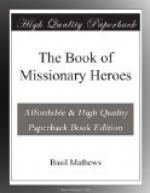Lull was learning Arabic from this sullen Saracen slave. He was studying the Koran—the Bible of the Mohammedans—so that he might be able to strive with the Saracens on their own ground. For Lull knew that he must be master of all the knowledge of the Moslem if he was to win his battles; just as a knight in the fighting Crusades must be swift and sure with his sword. And this is how Lull spoke of the Crusade on which he was to set out.
“I see many knights,” he said, “going to the Holy Land beyond the seas and thinking that they can acquire it by force of arms; but in the end all are destroyed before they attain that which they think to have. Whence it seems to me that the conquest of the Holy Land ought not to be attempted except in the way in which Christ and His Apostles achieved it, namely, by love and prayers, and the pouring out of tears and blood.”
Suddenly, as he and the Saracen slave argued together, the Moor blurted out passionately a horrible blasphemy against the name of Jesus. Lull’s blood was up. He leapt to his feet, leaned forward, and caught the Moor a swinging blow on the face with his hand. In a fury the Saracen snatched a dagger from the folds of his robe and, leaping at Lull, drove it into his side. Raymund fell with a cry. Friends rushed in. The Saracen was seized and hurried away to a prison-cell, where he slew himself.
Lull, as he lay day after day waiting for his wound to heal and remembering his wild blow at the Saracen, realised that, although he had learned Arabic, he had not yet learned the first lesson of his own new way of Crusading—to be master of himself.
IV
The Preparation of Courage
So Raymund Lull (at home and in Rome and Paris) set himself afresh to his task of preparing. At last he felt that he was ready. From Paris he rode south-east through forest and across plain, over mountain and pass, till the gorgeous palaces and the thousand masts of Genoa came in sight.
He went down to the harbour and found a ship that was sailing across the Mediterranean to Africa. He booked his passage and sent his goods with all his precious manuscripts aboard. The day for sailing came. His friends came to cheer him. But Lull sat in his room trembling.
As he covered his eyes with his hands in shame, he saw the fiery, persecuting Saracens of Tunis, whom he was sailing to meet. He knew they were glowing with pride because of their triumphs over the Crusaders in Palestine. He knew they were blazing with anger because their brother Moors had been slaughtered and tortured in Spain. He saw ahead of him the rack, the thumb-screw, and the boot; the long years in a slimy dungeon—at the best the executioner’s scimitar. He simply dared not go.
The books were brought ashore again. The ship sailed without Lull.
“The ship has gone,” said a friend to Lull. He quivered under a torture of shame greater than the agony of the rack. He was wrung with bitter shame that he who had for all these years prepared for this Crusade should now have shown the white feather. He was, indeed, a craven knight of Christ.




